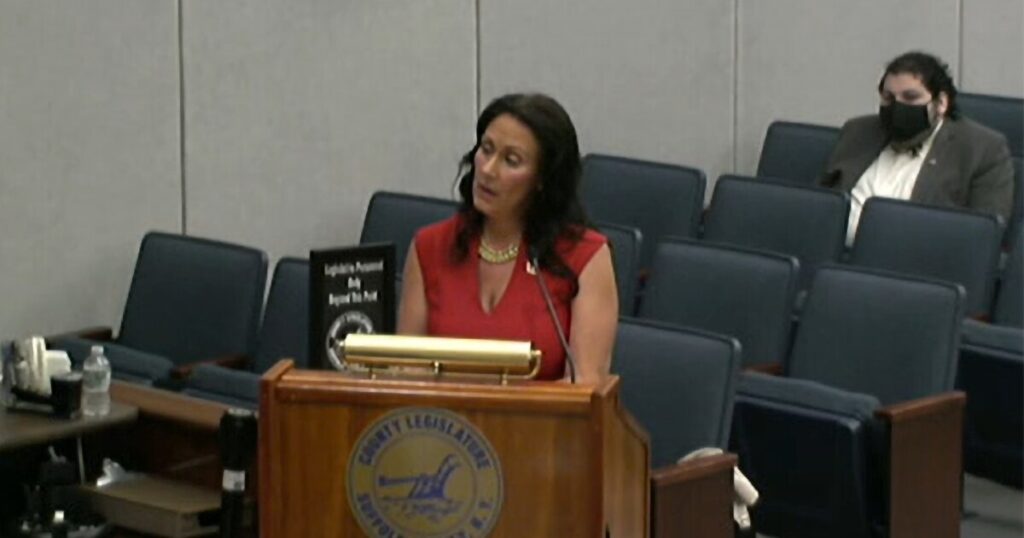Suffolk County has effectively ended its public campaign finance program.
Outside of New York City, Suffolk County was the largest county in New York to establish a public campaign finance program. It didn’t survive a year in operation — without supporting a single campaign — before Republicans took away its funding.
The program was only operational for a year. It was created to provide resources to help low-income women and people of color compete with candidates influenced by big donors. Candidates who agreed to special fundraising rules would have been able to access public dollars for the first time in the 2023 election cycle.
The county legislature, led by Republicans, repealed the program Wednesday. Two Democrats and a Republican abstained from the vote.
“This is a horrible waste of tax dollars,” said Legislator Dominick Thorne, R-Patchogue, who introduced the bill. “I am the exact reason why you don’t need this. … I had no union backup, no special interest. I had no big dollars coming into my campaign.
“If you want to run a campaign, that should not be at the behest of a taxpayer. And whether you call it taxpayer funds or general funds, it belongs to the taxpayers of this county.”
Similar programs throughout the country have been successful at prioritizing small donations from over large ones from special interests, which can reduce corruption and make elected officials more accountable to their constituents, according to Mercy Smith, who has led the Suffolk County public campaign finance program since it operational last June.
Efforts to save the program
Last week, Suffolk County Executive Steve Bellone, who appointed Smith last year, rallied with Democrats to save the program.
“Just as we have become a model for other suburban counties, let us not backtrack and become the model for what could have been,” he said.
The Suffolk County Campaign Finance Board is a nonpartisan, independent agency authorized to administer the Suffolk County Fair Elections Matching Fund Program. It establishes a 4-to-1 public match with individual contribution limits and a campaign finance board to ensure compliance for candidates who participate.
Candidates for both county executive and county legislator are eligible to access public matching funds through the program. Public funds provided through the County’s program may only be used for election efforts, including mailings, political literature, polling and staff.
Still, Presiding Officer Legislator Kevin McCaffrey said public money is better spent on taxpayers, not candidates.
“There is a more immediate need than for campaign finance, and we think that this money could be better spent in other ways,” McCaffrey said.
Where should the money go?
Republicans want to use funding from the repealed $2.6 million public campaign finance program to pay for public safety, like hiring 911 operators and expanding the Shotspotter gun violence detection system.
Legislator Steven Flotteron, R-West Islip, who chairs the budget finance committee and co-sponsored the bill, said having the money available in the general fund would help stave off layoffs and service cuts. Republicans also recent price hikes for gasoline, groceries and building materials could have a ripple effect in local government.
“We have to start looking at things which are — aside from saving taxes, if we can — not working effectively, and this law or this program will not be working effectively,” he said.
Flotteron also said the program would fund candidates for county executive and legislature who taxpayers might not want to support.
The program was funded by tax revenue from Jake’s 58 Casino in Islandia and other off-track betting operations in Suffolk County.
Legislator Jason Richberg, D-Wyndanch, said the county should not insist the “program is a travesty.” Instead, he said if all the money isn’t spent in a year, 10% should remain in the program and the rest should be reallocated to other programs.
“When we talk about campaign finance reform, no — there’s no silver bullet,” Richberg said. “We owe it to try.”
Without the program in place, Legislator Anthony Piccirillo, R-Holtsville, said lawmakers who receive large special interest donations should recuse themselves from votes when there’s a conflict of interest.
“We all have it in our power right now that if we accept a campaign contribution from a central district group who does business in front of this county, we can recuse ourselves without passing a bill,” Piccirillo said. “And it ends the influence of special interest money in our elections.
“But unfortunately, some people don’t want to do that, because either they don’t have the backbone to do it, or they want the taxpayer to bail them out.”

